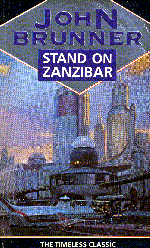|
Stand On Zanzibar
Copyright 1969 by
I first read this in 1972 and most recently in February 1998 In 2010, the entire population of the world, standing together, could still just fit on the island of Zanzibar. Unfortunately in 2010, the world population is out of control, many developed countries have introduced eugenics legislation to prevent transmission of hereditary defects such as sickle-cell anemia and colour-blindness. The world is in a mess, in many ways people are far worse off than their parents were. In this world we follow a host of characters: Donald Hogan, mild-mannered researcher and government agent has spent the past ten years living a lie. He shares an apartment with Norman House, up-and-coming black executive in a white world, and it's coloured his life so much he almost can't see what's going on. Both of them are about to unwillingly undergo life-changing and life-threatening experiences. Chad C. Mulligan, world famous sociologist and writer, wrote cynical analyses of modern society. People listened and agreed but still nothing changed Elihu Masters, US Ambassador to Beninia, is working with his old friend, that country's President Obomi. They have a revolutionary plan to save the country they love, but they'll have to sell out to big business to make it work. And Dr Sugaigujntung, possibly the world's greatest geneticist, may have discovered how to make genetic supermen. Sadly, John Brunner died in 1995. He was my favorite British SF writer from the Sixties and Seventies, and his major books, "Stand On Zanzibar", "The Shockwave Rider" and "The Sheep Look Up" certainly contributed to my outlook on life. This is his masterpiece. and thirty-years on, it's still a dazzling read. It's a revolutionary work from a revolutionary time, a sometimes-humorous, always-clever polemic against the stupidity that leads humankind to treat others as less than human, that leads to conflict and war. Of course, throughout this proselytising, the plot just rockets along. Several things struck me about this book reading it again after so many years. This was the '60s and giant computer brains were going to save or destroy the world, and can only be defeated by tying them into logic loops. Brunner certainly caught that meme, but used it with a twist for his Shalmaneser super-cooled and very small computer. His vision of the crime and drug-abuse in a modern society is a lot more accurate than he would have expected when he wrote this book. He's the only writer this side of Pynchon who could write a gripping thirty-one page narrative on a cocktail party. And finally, while I'm rambling on, I noticed for the first time just how good Brunner was at describing people in altered states. Particularly bouts of insanity (have a look at Hogan's experiences or when Philip Peterson goes postal). What's it got: artificial intelligence, world politics, spies, crime, drugs , spies, Africa and Asia, New York at its worst I was in my local "Wave" CD store and they were playing this stunning music: dry and hard dub reggae over Tom Jones' "It's Not Unusual". Bizarre, but it had me skanking down the aisles. Subsequently realised, somewhat embarrassed, that there were two entirely separate sound sources from different parts of the store. What was worse was that I was still singing the song to myself later in the afternoon. Of course there's no connection between this pointless reminiscence and the wonderful "Stand on Zanzibar" except that it's quite possible Mr Brunner hummed that little tune from the early sixties while penning this book. Well, not penning exactly, he wrote it all on a Smith Corona 250 electric typewriter. Stunning. Loaded on the 20th January 2002.
|





